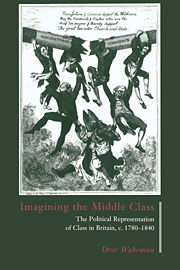5 - Taming the ‘middle class’
Published online by Cambridge University Press: 08 January 2010
Summary
[The] middle rank [consists of those] among whom almost all the sense and virtue of society reside. Their pretended incapacity for political affairs is an arrogant fiction of Statesmen which the history of Revolutions has ever belied.
(James Mackintosh, 1791)[The middle classes] are inert and timid, and almost as little qualified to defend a throne as they are disposed to overthrow it.
(James Mackintosh, 1815)During the later years of the Napoleonic war, the two leading literary and political periodicals in Britain, the Whig Edinburgh Review and its Tory rival the Quarterly Review, published articles about the social and political state of affairs in Sicily. The Edinburgh, in a review of a travel book by the future novelist John Gait, expressed approval both of Gait's ‘very unfavourable’ discussion of the Sicilian nobility and of observations on ‘the formation, in Palermo, of that comfortable middle class which is the best proof of a prosperous and free community’. The readers of the Quarterly, however, in its own review of another book about Sicily by G. Francis Leckie, learned about the island's social and political structure exclusively in the dual terms of nobles and commoners, or of higher and lower orders, between which – so the readers were assured – existed a benevolent paternalistic relationship. Since Leckie himself denied the existence of such a benevolent relationship, the Tory periodical denounced his book as dangerously Jacobinical, seditiously inciting the Sicilian lower classes to revolution.
The plot thickens when one reads Leckie's book, only to discover that in fact, not only did Leckie acknowledge the existence of a ‘middle class’ in Sicily, he even gave one section the title ‘Character of the middling Ranks’.
- Type
- Chapter
- Information
- Imagining the Middle ClassThe Political Representation of Class in Britain, c.1780–1840, pp. 157 - 183Publisher: Cambridge University PressPrint publication year: 1995



